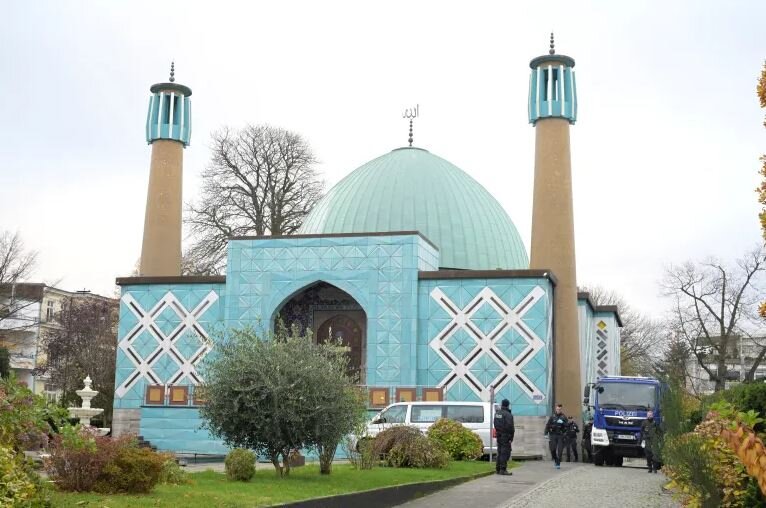German ban on Islamic centers an act of Islamophobia

MADRID- The German Ministry of the Interior has shut down the Islamic Center Hamburg (ICH) and its affiliated entities following serious accusations against its activities.
On Wednesday, the Ministry claimed that the CIH pursues radical Islamist objectives, leading to a ban on its operations and those of its subordinate entities.
According to a Ministry statement, 53 buildings associated with the organization were raided in the early hours of Wednesday under a court order issued in eight states across the country, as reported by Reuters. In addition to the Islamic Center Hamburg, activities of its branches in Frankfurt, Munich, and Berlin were also prohibited. As a result of this measure, the German Ministry of the Interior has announced the closure of four Shia mosques.
The authorities justify their decision not only by the purported "fight against radical Islamism," but also by considering the ICH as a "forward base of the Iranian regime in Germany and a hub of extremism." In the fall, 800 police officers had already raided the center and affiliated associations in several federal states, seizing documents, computers, mobile phones, and large sums of cash.
According to SPIEGEL, the Federal Ministry of the Interior, led by Nancy Faeser (SPD), has banned all activities of the ICH. In a public statement, the Minister said that "after evaluating the evidence, the Ministry's suspicions were confirmed: the center promotes totalitarian Islamist ideas of governance, anti-Semitism, and hostility towards Israel, and supports the terrorist organization Hezbollah, which is allied with the Iranian regime and banned in Germany."
The Federal Office for the Protection of the Constitution has been monitoring the CIH for decades. In its most recent annual report, the Office describes it as a "significant Iranian propaganda center in Europe."
It is crucial to analyze the use of the language of terrorism, radicalism, and extremism, as this language seeks to criminalize movements such as Iran and Hezbollah that articulate their resistance to the Western project through non-secular discourse. This approach is employed by the West—understood as an ideology rather than merely geography—to deny the possibility of an autonomous political identity based on Islam.
In this context, it is important to highlight that Islamism is the discourse aiming to position Islam as the central point of politics within Muslim communities. The identification, as seen with the Islamic Center Hamburg, of Islamism with violence or terrorism is part of a mechanism designed to discipline the Muslim population according to the principles of "Westernism": a set of concepts that grants secularism and liberalism normative power to define what constitutes good politics.
This Orientalist perspective continues to frame the observation of Muslim populations outside the Eurocentric narrative. Orientalism assumes that the Western ideology or paradigm is universal and can be seamlessly applied to understand and explain non-Western phenomena. According to this view, the normative Western perspective holds that Islam cannot be used as a political tool.
Similarly, the language of terrorism, radicalization, and extremism functions as a civilizational language, designed to construct and control the "rebel" population. It operates as a racializing language, with the primary goal of eradicating Muslim identity.
These practices, which represent a type of racism targeting expressions of Muslim identity or the perception of such identity, are known as Islamophobia. The aim of Islamophobia is to prevent Muslims from projecting themselves politically in the future, hindering their ability to build a future as Muslims.
Manifestations of Islamophobia are diverse, and no single essence captures all the phenomena within this category. Instead, we can identify a series of common characteristics that are articulated in various ways and contexts. The different forms in which Islamophobia manifests are conditioned by historical, cultural, and socioeconomic contexts.
Islamophobia can be evidenced, for example, in various attacks against individuals perceived as Muslim. These attacks may be carried out by individuals acting alone, in semi-organized groups, or in organized groups, and can range from insults and the removal of veils from women to physical assaults and murder.
Additionally, Islamophobia manifests in attacks against properties considered Muslim, such as cemeteries, mosques, and private businesses. These attacks can vary from vandalism and desecration to arson and property destruction.
Moreover, acts of Islamophobia are represented through forms of intimidation, including verbal harassment, threats, stalking, and other forms of psychological intimidation directed at individuals or communities based on their perceived Muslim identity.
There are also manifestations of Islamophobia that involve discriminatory treatment of individuals identified as Muslim. This can include prejudice, bias, and unequal treatment in areas such as employment, education, housing, public services, and other social contexts. It may involve exclusion, stereotyping, or denial of rights and opportunities based on perceived Muslim identity.
In these cases, the state's role may be relatively passive. However, in other situations, Islamophobia involves active state participation against individuals considered Muslim. This can include surveillance and monitoring, imprisonment, accusations of terrorism and extremism, and the implementation of discriminatory policies and laws specifically targeting Muslims.
Although the specific dynamics and contexts may vary, a common thread of Islamophobia runs through these situations, perpetuating unjust treatment and restrictions against Muslims. The closure of the Islamic Center Hamburg and the accusations of "extremism" and "terrorism" are part of this Islamophobic discourse that aims to keep Muslims as disempowered and as "alien bodies." They are depicted as "dangerous others" who must be constantly monitored to preserve Germany's political stability.
Leave a Comment